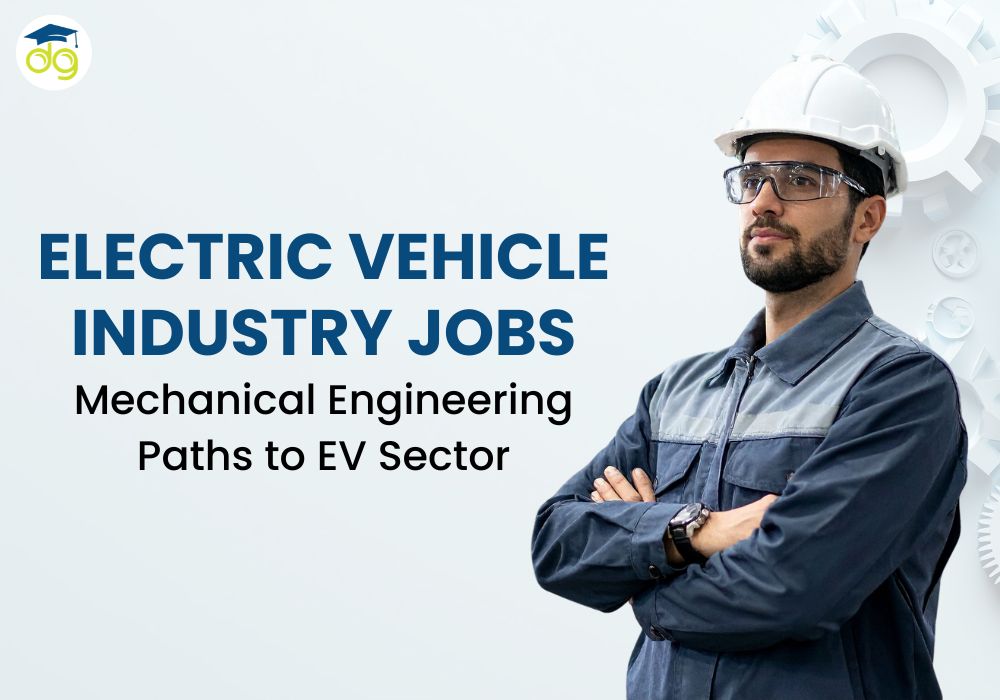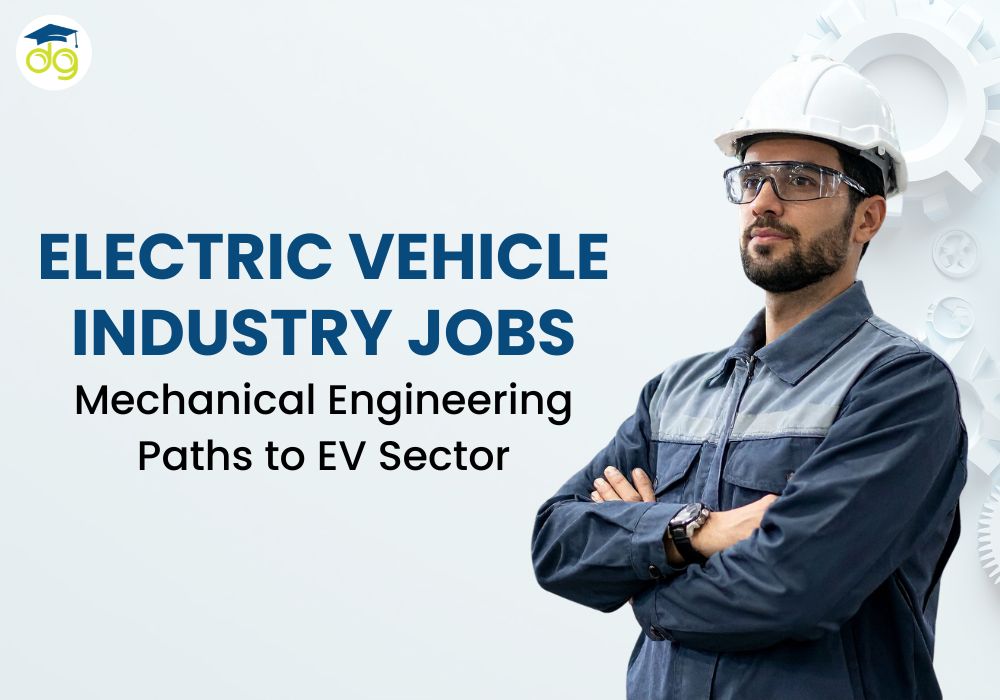Electric Vehicle Jobs: Top Mechanical Engineering Careers in EV Sector
EV Industry Opens New Career Paths for Mechanical Engineers in India
The worldwide shift toward green and sustainable transportation has made electric car (EV) sector one of the most rapidly growing sectors of contemporary engineering. With India hoping for a substantial growth in EV use by 2030, the demand for qualified professionals has risen in areas such as manufacturing, design as well as thermal technology.
The main players in the EV revolution among the key players in this transformation are mechanical engineers. Their knowledge of engineering and designing, manufacturing techniques, materials and thermal systems is essential to EV development. Nowadays, jobs for mechanical engineers within the electric vehicle industry have risen far above conventional roles. They now cover all aspects of mechanical design engineering up to sophisticated battery and thermal management systems.
With the EV market expands mechanical engineers are able to find fascinating career options that mix conventional skills and modern technology.
The Rise of the Electric Vehicle Revolution
The electric vehicle revolution is more than a shift in the fuel type. It is an entire change in the way automobiles are constructed, designed and maintained. In India there are initiatives such as FAME (Faster Adoption and Manufacturing of Hybrid Vehicles) scheme FAME (Faster Adoption and Manufacturing of Hybrid and Electric Vehicles) program and subsidies at the state level have driven an explosion of EV development.
The world's largest automotive companies and start-ups alike, such as Tesla, Tata Motors, Ola Electric and Ather Energy are investing heavily into R&D infrastructure, R&D, and Industry 4.0 technologies.
The EV manufacturing system is based on robotics, automation as well as smart manufacturing technology. Manufacturing engineering is evolving thanks to IoT-powered devices, predictive maintenance and computer-aided quality control. This has created a wealth of opportunities for mechanical engineers with a background in cutting-edge design and manufacturing tools.
The need for automotive mechanical engineering experts is growing in companies that are seeking to improve the performance of their vehicles, cut down on weight and improve the efficiency of driving.
In a nutshell, the EV revolution is changing what mechanical engineers can do, and the way they go about it.
Why Mechanical Engineers Are Vital to the EV Industry
Electric vehicles are powered by electricity but they're still devices that are heavily dependent on the mechanical and system integration. The core mechanical part of EVs are in the manner that their the components are designed, constructed or cooled and produced.
An mechanical design engineer is a key player when designing components such as frames, suspensions, brake system, battery housings, and so on. The job of a mechanical design engineer is to make sure all components are lightweight effective, safe, and efficient. The task of cutting drag, enhancing aerodynamics and making sure that durability is maintained in light materials has resulted in engineering and designing challenging and more rewarding more than before.
A third critical area includes thermal engineering. The batteries for EVs must stay within a specific temperature range to function safely. Mechanical engineers specializing in thermal management develop systems that prevent overheating while maintaining efficiency--especially for batteries for electric vehicles.
They are based upon collaboration among engineering, R&D, and manufacturing engineering teams. This makes mechanical engineers indispensable for the EV value chain.
Top Job Roles for Mechanical Engineers in the EV Industry
The EV sector offers a variety of options for career opportunities for mechanical engineers dependent on their areas of expertise as well as their specialization. Here are a few most popular jobs:
Job Role | Key Responsibilities | Essential Skills/Software |
| Mechanical Design Engineer | Designs for EV parts like enclosures, chassis and motor mounts | SolidWorks, CATIA, AutoCAD |
| Manufacturing Engineer | Supervise the production lines, quality control as well as automation system | Lean Manufacturing, Robotics, PLCs |
| Battery Thermal Engineer | Control heat dissipation, and design cooling strategies for electric vehicles. | CFD, ANSYS, MATLAB |
| Automotive Mechanical Engineer | Create and test mechanical systems - suspension and braking systems as well as transmission | Simulation, Vehicle Dynamics |
| R&D Engineer | Test lightweight materials, research light-weight materials, prototypes and designs, then optimize them | FEA tools, 3D Modelling |
| Quality Control Engineer | Make sure that the thermal and mechanical standards meet in production | ISO Standards, Testing Tools |
Every one of these jobs combine traditional mechanical expertise along with the latest EV technology, resulting in sustainable and fulfilling pathways to career advancement.
Jobs for mechanical engineers today require collaborative cross-functionality as well as digital simulation and precise design, making them key players in the green mobility trend.
Essential Skills for Transitioning to the EV Sector
Mechanical engineers moving into the electric vehicle sector need to adapt to changing demands of the industry. Although a fundamental understanding in mechanical engineering work remains essential the ability to master interdisciplinary abilities is crucial.
These are the most useful skills required by engineers in the field of the field of EV design and manufacturing:
- Battery Management and Design: Understanding lithium-ion cell the chemistry, structure and security.
- Thermo Management Systems: Constructing cool systems that maintain battery power.
- 3D Modeling and Simulation Utilizing CAD/CAE tools in order to improve aerodynamics and efficiency.
- Materials Engineering: Making use of lightweight composites, which can increase the range of applications and speed.
- Industrial 4.0 Technologies: Robotics learning, Quality monitoring using AI and digital twins.
- Additive Manufacturing (3D Printing): Prototyping faster, cheaper and higher quality.
Mechanical engineers of the future will have to think in a digital way, combining design and information. This will can bridge the gap between the traditional mechanics world as well as the fast-growing digitizing EV world.
Best Electric Vehicle Courses for Mechanical Engineers
In order to stay in the game, mechanical engineers have to continually improve their knowledge. Fortunately, several electric vehicle courses are offered in India and around the world are now focusing on training engineers for the industry of electric vehicles.
Here are a few of the most popular categories of courses:
Course Type | Key Focus Areas | Ideal For |
| EV Design & Manufacturing | Chassis design, material selection, component integration | Design Engineers, R&D Engineers |
| Battery Management & Thermal Systems | Cooling systems for batteries and charging systems and thermal modeling | Thermal & Battery Engineers |
| Automotive Electronics & Embedded Systems | Sensors, control units, and connections | Mechatronics Engineers |
| Advanced CAD for EV Components | Design and simulation for light EVs | Mechanical Design Engineers |
| EV Powertrain Design | Optimization of torque, drivetrains, as well as motor design | Automotive Mechanical Engineers |
Popular platforms for learning like IIT Bombay (NPTEL), Coursera, edX, and Skill-Lync have customized courses for engineers looking to transition to the electric vehicle industry.
The completion of accredited electric vehicle courses could dramatically improve your chances of being employed giving you an advantage in the job market.
Leading EV Companies Hiring Mechanical Engineers in India
The Indian electronic vehicle (EV) ecosystem is expanding quickly, creating a vast variety of possibilities for engineers. Companies are now seeking engineers with a deep understanding of traditional mechanical structures and new technology.
Company | Mechanical Roles Offered | Focus Area |
| Tata Motors | Manufacturing, mechanical design, and prototyping | Passenger Electric Vehicles |
| Ola Electric | Component and battery design Production engineering, battery design | Scooters & Battery Packs |
| Ather Energy | R&D as well as mechanical design engineering | Smart Motorcycles |
| Mahindra Electric | Design of structural structures as well as thermal engineering and testing | Four-Wheelers |
| Hyundai & MG Motor | Integrating products with vehicle mechanics and the car | Global EV Platforms |
| Hero Electric | Engineering for manufacturing and thermal system creation | Two-Wheelers |
They represent the variety of jobs for mechanical engineers across India's ecosystem of electric vehicles, from designs labs to assembly lines.
Transitioning from traditional Mechanical into EV Engineering
Mechanical engineers who are rooted within traditional industries such as automotive and heavy equipment, the move to the new EV industry can appear daunting, but it's not.
A planned path may aid in bridging the gap between skills:
- Test Transferable Skills: Thermodynamics, mechanical design and manufacturing are still highly pertinent.
- Learn Specialized Courses: Enroll in electronic vehicle courses that cover electronics, batteries and control.
- Create small EV Projects: Build prototypes, models, or make mock-ups for demonstration of the capabilities.
- Intern or collaborate on Startups: Gain exposure to assembly lines for EV and research and development practices.
- Create a digital Portfolio: Showcase design projects and simulations on the internet.
- Network strategically: Attend EV expos or workshops, forums and events for networking with people who are looking for recruiters.
Combining conventional knowledge and cutting-edge understanding, mechanical engineers could quickly transition into automotive mechanical engineering positions that are focused on innovation and sustainability.
Future Scope: Is Automotive Mechanical Engineering a Good Career in EVs?
The future of automotive mechanical engineering within the electric vehicle industry is extremely bright.
While India is pushing forward to electrify its economy, initiatives of the government along with corporate investments as well as consumer demand, are aligned perfectly. Mechanical engineers will keep leading developments regarding design engineering, thermal systems, and manufacturing engineering--core factors that are the basis of the performance of EVs.
In the world, the EV technology is predicted to create millions of technical jobs in the coming decade. Engineers who are skilled in Industry 4.0 technologies and digital design tools will be in particularly sought-after.
In the end, mechanical engineers aren't being changed by technology - they are empowered by it. Their profound understanding of the mechanics, material and design makes sure they will remain at the center in the EV revolution.
Conclusion
The rise of electric motors opens up a whole new avenue for engineers in mechanical engineering. Every time an electric vehicle hits the streets, there's always mechanical experts to design it, its power, and efficacy.
Mechanical professionals who adapt to the evolving demands of EV manufacturing--through specialized electric vehicle courses, modern design software, and thermal system mastery--will continue to find abundant opportunities in India and beyond.
Whatever it is, automotive mechanical engineering, manufacturing engineering, or design engineer jobs, the future looks positive for those that are looking to create.
Find the top-rated Electric Vehicle Courses, specific Mechanical Design Engineering programs, and reputable universities at SkoodosBridge your one-stop platform for verified academic and career pathways in modern engineering.
Create your future now. Go to SkoodosBridge and advance your career within the electric vehicle sector.
FAQs
1. What are the best jobs for mechanical engineers in the electric vehicle industry?
Mechanical engineers are able to be employed in the fields of the design and thermal engineering fields manufacturing, research, and production at the most reputable EV firms.
2. How can a mechanical engineer transition to the EV sector?
Through advancing their skills in EV designs, batteries and industry 4.0 technology through accredited courses and hands-on tasks.
3. What courses should mechanical engineers take for EV jobs?
Courses in EV design, battery management, and manufacturing automation are highly recommended.
4. Which companies hire mechanical engineers for electric vehicles in India?
Tata Motors, Ola Electric, Ather Energy, Mahindra Electric, Hyundai as well as MG Motor are among the most sought-after recruiters.
5. Is automotive mechanical engineering a good career in EVs?
Yes, In the current global trend towards electric vehicles, mechanical engineering has excellent job prospects.
Categories
Archives
- October 202521
- September 202520
- August 202522
- July 202524
- June 202524
- May 202526
- April 202530
- March 202523
- February 202513
- January 202523
- December 202429
- November 20246
- September 20245
- August 202422
- July 202415
- May 20249
- June 202424
Similar Posts

Electric Vehicle Jobs: Top Mechanical Engineering Careers in EV Sector
by Skoodos Bridge

EdTech Careers After Engineering: Build Learning Apps & Startups
by Skoodos Bridge

Gaming Meets Medicine: VR Therapy Careers for NEET Aspirants
by Skoodos Bridge

WhatsApp Group Study: Boost Your Competitive Exam Preparation
by Skoodos Bridge

Drone Engineering Careers: Aerospace Pathways, Exams & Job Opportunities
by Skoodos Bridge

Instagram vs LinkedIn: Smart Social Media Strategy for UPSC Aspirants
by Skoodos Bridge

YouTube Shorts for Revision: Micro-Learning to Memorize Formulas Quickly
by Skoodos Bridge

ChatGPT for JEE Physics: Smart Prompts to Master Problem Solving
by Skoodos Bridge

Space Technology Careers: ISRO Opportunities Beyond Aerospace Engineering
by Skoodos Bridge


Leave a Comment